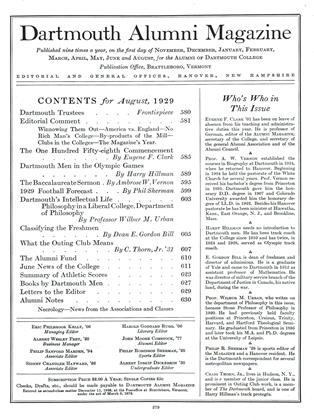Prof. J. H. Gerould writes the following appreciation of the collection recently given to the College: "Mrs. Moses Dyer Carbee (Mary Dexter Carbee) of Haverhill, N. H., has presented to Dartmouth College a very large and exceedingly valuable collection of insects, mainly butterflies, moths, and beetles, to be known as the John Dexter Locke Collection.
"Mr. Locke became a special student in natural history under Professor H. G. Jesup in '83-'84. Henry Clinton Fall, '84, the distinguished entomologist to whom Dartmouth in June, 1929, awarded the honorary degree of S. D., then a senior in the Chandler Scientific School, was engaged by Professor Jesup to tutor John Dexter Locke in entomology, which resulted in a life-long friendship between them.
"Mr. Locke bought the collection which now bears his name from the widow of a Prof. Schneider of Vienna in Feb., 1889. From the huge bird-like moths to the tiniest species just visible without a lens, the specimens had been prepared with meticulous care, labelled, and systematically arranged.
"Nearly 3000 species of butterflies and moths and 6000 species of beetles are represented, over 30,000 specimens altogether, besides a unique collection of over 1100 skilfully inflated caterpillars of European Lepidoptera.
"Among the 560 species of non-European butterflies and moths are some of the most dazzlingly brilliant South American Morphos, the iridescent colors of which depend upon the physical structure of the scales. Fourfifths of the species of butterflies and a majority of the beetles in the collection are European. The non-European beetles from the tropics include species of enormous size.
"Keenly interested in all the details of this extensive collection, Mr. Locke for forty years until his recent death has given it the studious care upon which much of its present beauty and scientific interest depend.
"The collection is one of the most important features of the new museum in Wilson Hall. Installed in the ample gallery to be devoted to the study of insects, along with entomological books from Mr. Locke's library, it will serve a most useful purpose. About it as a nucleus, it is hoped that other entomological collections will gradually be added."
Mrs. M. D. Carbee, who has presented the Locke collection to the College, has written the following account of the life of the famous collector:
"A sketch of the life of Mr. Locke, whose collection of butterflies and beetles, consisting of more than thirty thousand specimens, has been given to Dartmouth.
"John Dexter Locke, the only child of S. Morris and Sarah E. Locke, was born in San Francisco, California, November 21st, 1860.
"He spent his childhood and early youth in California, New York, Massachusetts, and France.
"For many years ceaseless but unavailing effort was made, by every means known to medical science, to overcome his lameness.
"Educated in New York City at the famous Anthon School until his father's death in 1876, he afterward became special student at Dartmouth, Harvard, Columbian College—now the George Washington University—and in Vienna, Austria, where he spent two years in microscope work.
"A tireless student in Latin, Greek, and the modern languages, an enthusiastic worker in the discovery of additions to the knowledge of the structure and life history of insects and of plants, with great skill and utmost success in work with the microscope, with unfailing interest and enjoyment in translating into English "C. Plini Secundi Naturalis Historiae"—more than half completed at the time of his death,'—his life was a singularly happy one, his cross of lameness, and in late years of deafness, uncomplainingly and smilingly borne.
"He was an indefatigable collector of books, shells, coins, minerals, and especially of butterflies and beetles.
"His readiness to share with others the pleasure of his collections, his great kindness of heart, and his generosity, won for him a host of friends.
"His interest in traveling took him to many parts of Europe, and in North America from the Atlantic to the Pacific, from Northern Canada to the City of Mexico.
"In the city of Washington, District of Columbia, on the 7th of February, 1929, after a few days' illness, there came the earthly ending of his blameless, brave, and honored life."
ROBERT B. KEELER 'l] Recently elected councilor from the Central States District
 View Full Issue
View Full Issue
More From This Issue
-
 Class Notes
Class NotesCLASS OF 1879
August 1929 By Henry Melville -
 Article
ArticleAlumni Council Meetings
August 1929 -
 Article
ArticleThe One Hundred Fifty-Eighth Commencement
August 1929 By Eugene F. Clark -
 Class Notes
Class NotesCLASS OF 1899
August 1929 By Warren C. Kendall -
 Class Notes
Class NotesCLASS OF 1903
August 1929 By John Crowell -
 Class Notes
Class NotesCLASS OF 1918
August 1929 By Frederick W. Cassebeer








